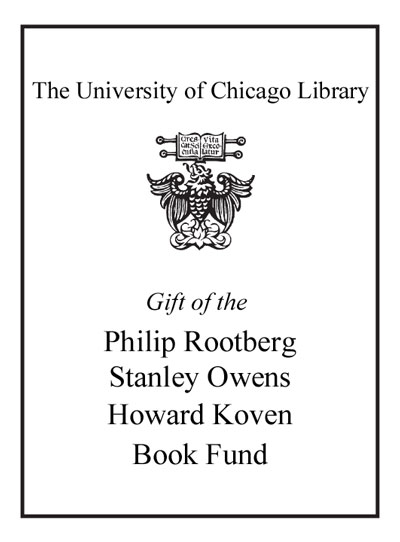Reason and experience in Mendelssohn and Kant /
Saved in:
| Author / Creator: | Guyer, Paul, 1948- author. |
|---|---|
| Edition: | First edition. |
| Imprint: | Oxford ; New York, NY : Oxford University Press, 2020. |
| Description: | 1 online resource. |
| Language: | English |
| Subject: | |
| Format: | E-Resource Book |
| URL for this record: | http://pi.lib.uchicago.edu/1001/cat/bib/12453881 |
Table of Contents:
- Intro
- Halftitle page
- Title page
- Copyright page
- Table of Contents
- Acknowledgments
- Abbreviations
- Mendelssohn:
- Kant:
- Introduction
- 1. Prologue: The Prize Essays
- 1. The Competition
- 2. The Certainty of Mathematics in Mendelssohn and Kant
- 3. Mendelssohn and Kant on Metaphysical Knowledge
- 4. Mendelssohn's and Kant's Arguments for the Existence of God
- 5. Mendelssohn and Kant on the Metaphysics of Morality
- 6. Conclusion
- Part I. Metaphysics and Epistemology
- 2. Mendelssohn, Kant, and Proofs of the Existence of God in Kant's Pre-Critical Period
- 1. From Idea to Reality
- 2. Mendelssohn's Prize Essay
- 3. Kant: From the New Exposition to the Only Possible Basis
- 4. Mendelssohn's Response to the Only Possible Basis
- 3. Proofs of the Existence of God in the Critique of Pure Reason and Morning Hours
- 1. Kant: Critique of Pure Reason
- 2. Mendelssohn's Morning Hours
- 4. Mendelssohn and Kant on the Immortality of the Soul
- 1. Introduction
- 2. The Argument of Phaedo
- 3. Kant's Initial Assimilation of Mendelssohn's Conception of Immortality
- 4. Kant's Diminution of the Postulate of Personal Immortality
- 5. The Immortality of the Species rather than the Person
- 5. Mendelssohn, Kant, and Idealism
- 1. Introduction
- 2. Mendelssohn, Kant, and the Transcendental Ideality of Time
- 3. Mendelssohn's Refutation of Idealism in the Morning Hours
- 4. Mendelssohn's Modest Epistemology
- 5. Kant's Transcendental Idealism and Transcendental Refutation of Idealism
- Part II. Aesthetics
- 6 Mendelssohn's Aesthetics
- 7. Kant's Aesthetics
- 8. Mendelssohn's and Kant's Aesthetics Compared
- Part III. Religion, Politics, and History
- 9. Mendelssohn, Kant, and Enlightenment
- 1. Introduction
- 2. What is Enlightenment?
- 3. What Does It Mean to Orient Oneself in Thinking?
- 10. Freedom of Religion in Mendelssohn and Kant
- 1. Introduction
- 2. Locke
- 3. Mendelssohn
- 4. Kant on the Separation of Church and State
- 11. Judaism, Christianity, and the Religion of Pure Reason
- 12. Mendelssohn, Kant, and the Possibility of Progress
- 1. Abderitism or Chiliasm?
- 2. Kant's Moral Abderitism
- 3. Kant's Political Abderitism
- 4. Conclusion
- Bibliography
- Index

